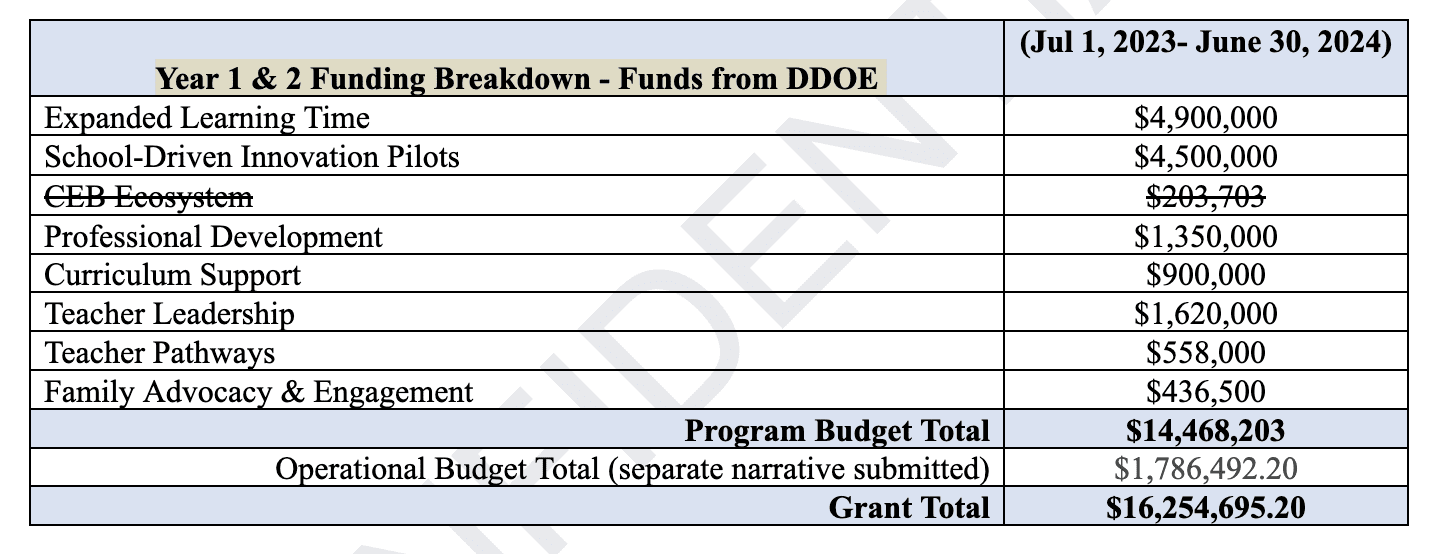

The Wilmington Learning Collaborative is made up of nine city elementary schools across three districts.
The Wilmington Learning Collaborative’s governing council voted Tuesday night for a budget containing various programs intended to improve outcomes for city students.
The budget is for this fiscal year, which concludes June 30, 2024. It totals $16,632,690.20, with $10 million set in the state budget for this year, and the other $6,632,690.20 is carryover funds from last year.
Executive Director Laura Burgos said the programs are largely a result of her working with all nine principals of the schools involved in the collaborative.
She also said it’s important the budget gets passed so the group isn’t in January or February and still waiting to get programs started.
The collaborative’s state funds are allocated towards the following initiatives:
Those funds are then further broken down by the collaborative, whose goal is to improve academic and societal achievement for students at nine city of Wilmington elementary schools across the Brandywine, Christina and Red Clay school districts:
Expanded Learning Time ($4,900,000)
Summer Academy – $3,000,000
A Summer Academy will be created to serve at least 2,500 students from mid-June through mid-August.
The program will span 6-8 weeks across multiple WLC school sites and staffed by current teachers, administrators, paraprofessionals, and nonprofit partners.
There will be a weekly skill focus and thematic unit with daily activities focused on project-based learning and STEAM activities.
Spring Break Academy – $750,000
The Spring Break Academy will serve students at or approaching grade level, as well as students identified as Gifted and Talented, which by state code, are students identified with the capability of high performance because of their:
- general intellectual ability
- specific academic aptitude
- creative productive thinking
- leadership ability
- visual and performing arts
- psychomotor ability
Attendance will be emphasized and student participation will be incentivized through gift cards and technology equipment. This will be an invite-only pilot program.
Programming content will focus on 21st Century Skills with students participating in college and career readiness activities led by local nonprofit partners and career professionals.
The academy will take place from April 1 – April 5 and serve up to 500 students across.
Saturday STEAM Academy – $500,000
The WLC Saturday STEAM Academy will be a weekly full-day college exploration opportunity taking place at the Delaware State University Campus, a contracted partner of the collaborative.
It will be a six-month pilot running from January to June 2024 and serve up to 100 students.
Students will participate in approximately 20 daylong sessions, attending college-like courses focused on science and technology.
Learning activities will be led by DSU students and faculty, and chartered buses will pick up students from downtown Wilmington to campus.
Early Academy (On-site) – $500,000
The Early Academy is designed to reduce student tardiness by providing early morning tutoring and mentorship support.
This program will target students in Pre-K through fifth grade and will be piloted at two or three WLC school sites (those without existing early learning programs).
Timely student arrivals will be tracked and families will be rewarded via gift card incentives for reaching attendance goals.
The program will be staffed by parents, nonprofit partners, and other community members who are cleared for school employment.
Student Transportation – $150,000
Given the current shortage of yellow bus drivers and available vehicles, the WLC is looking to partner with private van and charter bus operations to alleviate the current strain on yellow bus companies.
This allocation will allow the collaborative to explore at least one or two long-term partnerships.
This may include working with local rental van companies and employing retired school personnel as drivers.
School-Driven Innovation Pilots – Educator Leader Teams ($4,500,000)
Achievement Solution Pilots – up to $500,000 per school
Each school-based educator leader team will be provided with an initial Year 1 allocation of $500,000 to design and implement a pilot solution to an existing school goal, as indicated on the annual success plan.
Team members will use data to define a focus area, target outcome, and student subgroup to serve through the identified solution.
Teacher Stipends – $15,000 x 9 schools
Additional compensation for team leaders and team members who engage in pilot design, implementation, progress monitoring outside of contractual hours.
Professional Development ($1,350,000)
$150,000 per school x 9 schools
Administrators
Targeted support for school leaders informed by results of the landscape analysis and customized by school.
Based on current data, these supports may include, culturally-proficient mindsets and practices, leader affinity spaces, delivering feedback and progress monitoring and creating a culture of high expectations.
Teachers
Targeted support for classroom teachers, coaches, content specialists and other instructional support staff informed by results of the landscape analysis and customized by school.
Based on current data, these supports may include culturally-proficient mindsets and practices, teacher affinity spaces, checking for student understanding, maintaining data dashboards, reteach strategies, delivering strong Tier 1 instruction, differentiating instruction for varying learning abilities and supporting multilingual learners.
Curriculum Supports ($900,000)
$100,000 per school x 9 schools
Additional curricular tools and access to e-learning supports to deepen understanding and delivery of standards-based teaching, such as materials to support 95 Percent curriculum implementation.
Teacher Leadership ($1,620,000)
Multi-Year Teacher Leader Program – $45,000 per teacher x 36 teachers (4 per school)
Expansion of current Redding-funded Teacher Leader program to include support for a maximum of four teacher leaders per building, including one teacher per core content area (math, literacy, science and social studies).
This will be a three-year program with a stipend that increases with each year of commitment to a teacher’s home school. The breakdown will be as follows:
Year One – $10,000 stipend
Year Two – $15,000 stipend
Year Three – $20,000 stipend
This multi-year approach will allow the collaborative to study and analyze the relationship between defined increases in teacher compensation over time and same-school retention.
Teacher Pathways ($558,000)
Teacher Advisory Committee – 18 teachers x $1,000 stipend = $18,000
This is funding for a committee of teacher representatives for the nine WLC schools who will serve as a steering committee to support the design, execution, and messaging of the programs
Each school will be represented by two teachers, one who is currently in the first year at the school and one who has at least two or more years of service at their respective school.
Tuition Support – $50,000 per school x 9 schools = $450,000
The director of educator pathways, to be hired, will manage a tuition fund to offset costs associated with continuation of coursework for paraprofessionals, substitute teachers, teachers on record and other support staff pursuing teacher certification and/or advanced degrees.
Test Prep (Parapro, Praxis) – $5,000 per school x 9 schools = $45,000
Additional funding to provide tutoring and coaching support to aspiring educators seeking to successfully complete testing requirements.
Childcare – $5,000 per school x 9 schools = $45,000
Child care assistance to ensure participants in the educator pathways program are able to attend classes and complete certification requirements while balancing family needs.
Family Advocacy and Engagement ($436,500)
Family Advisory Committee – 27 members x $1,000 stipend = $27,000
This is funding for a committee of family representatives for the nine WLC schools who will serve as a steering committee to support the design, execution, and messaging of the signature programs.
Each school will be represented by three parents (or family members) across student grade levels.
Parent Advocacy Camp – $10,000 x 9 schools = $90,000
A series of in-person and virtual learning experiences designed in collaboration with local parent advocacy groups like SAFE Delaware or ACLU, and focused on building parent capacity to better understand school success plans, the school improvement process, budget allocations, school policies and a variety of other school and district processes.
These will be paid learning opportunities taking place within WLC school communities.
Parent Nights – $10,000 x 9 schools – $90,000
A monthly series of family math, literacy, and skill focus nights designed to engage whole families and strengthen school-home communication.
Funding will cover material costs, staff stipends, family raffles/incentives and meals.
School-Based WLC Resource Centers – $2,500 x 9 schools = $22,500
Onsite message boards and/or information hubs showcasing the work of the collaborative and promoting opportunities for engagement.
Locations will be determined in collaboration with school leaders and staffed by parents and other volunteers.
These onsite resource centers will be used to distribute invites to events and signature programs as well as WLC-branded items like water bottles, school supplies and T-shirts.


Raised in Doylestown, Pennsylvania, Jarek earned a B.A. in journalism and a B.A. in political science from Temple University in 2021. After running CNN’s Michael Smerconish’s YouTube channel, Jarek became a reporter for the Bucks County Herald before joining Delaware LIVE News.
Jarek can be reached by email at [email protected] or by phone at (215) 450-9982. Follow him on Twitter @jarekrutz
Share this Post




